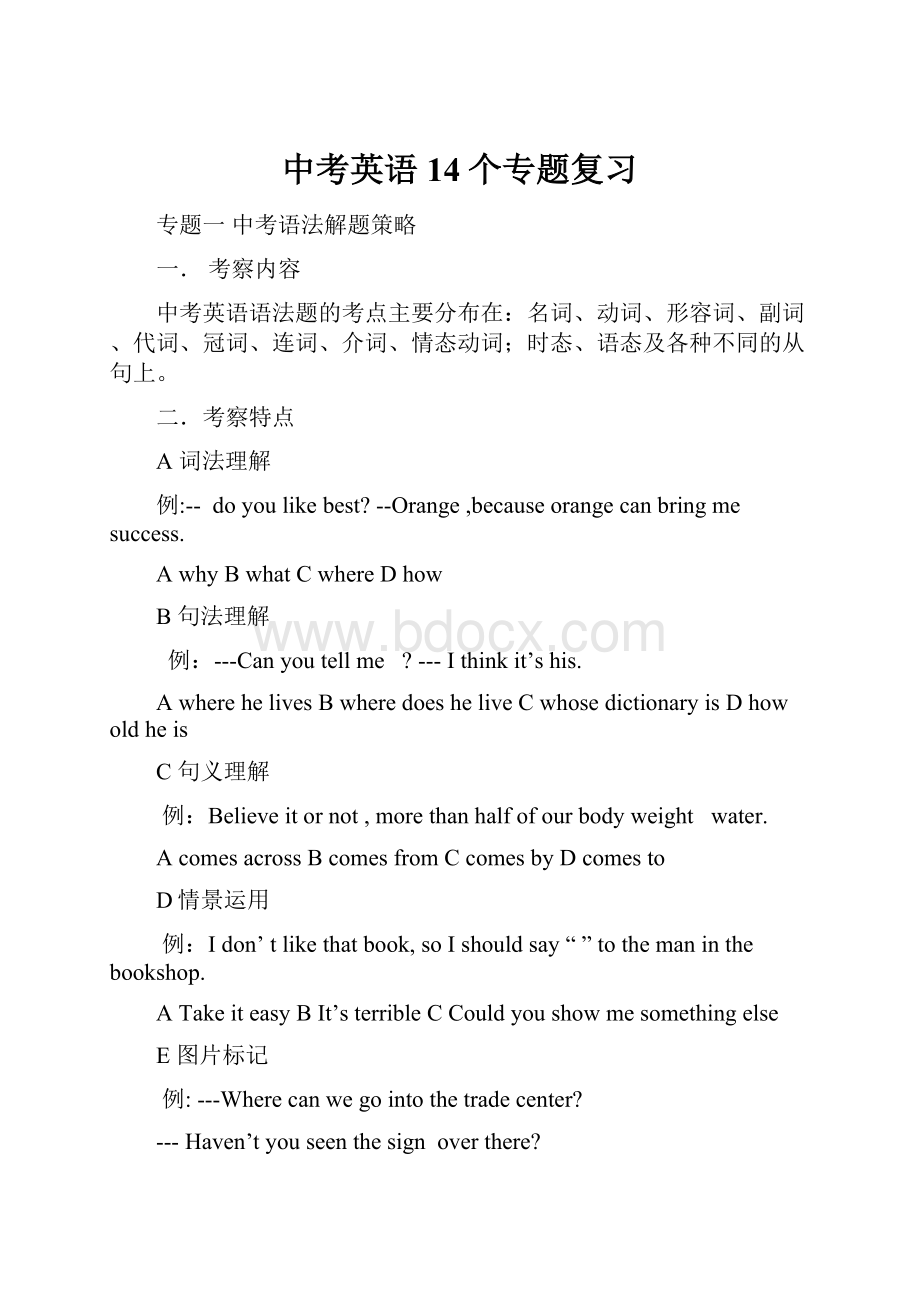中考英语14个专题复习.docx
《中考英语14个专题复习.docx》由会员分享,可在线阅读,更多相关《中考英语14个专题复习.docx(43页珍藏版)》请在冰豆网上搜索。

中考英语14个专题复习
专题一中考语法解题策略
一.考察内容
中考英语语法题的考点主要分布在:
名词、动词、形容词、副词、代词、冠词、连词、介词、情态动词;时态、语态及各种不同的从句上。
二.考察特点
A词法理解
例:
--doyoulikebest?
--Orange,becauseorangecanbringmesuccess.
AwhyBwhatCwhereDhow
B句法理解
例:
---Canyoutellme?
---Ithinkit’shis.
AwherehelivesBwheredoesheliveCwhosedictionaryisDhowoldheis
C句义理解
例:
Believeitornot,morethanhalfofourbodyweightwater.
AcomesacrossBcomesfromCcomesbyDcomesto
D情景运用
例:
Idon’tlikethatbook,soIshouldsay“”tothemaninthebookshop.
ATakeiteasyBIt’sterribleCCouldyoushowmesomethingelse
E图片标记
例:
---Wherecanwegointothetradecenter?
---Haven’tyouseenthesignoverthere?
D.EXIT
C.ENTRANCE
B.CLOSED
A.OPEN
三.方法技巧
A逐一排除
例:
--Howoftendoyougobacktoyourhometown?
--.
ASincethreeweeksagoBForthreeweeksCInthreeweeksDEverythreeweeks
B分析比较
例:
--isTony’sopinionaboutEnglishfood?
--Delicious
AHowBWhyCWhereDWhat
C逻辑推理
例:
fathersarebothscientists.
AJim’sandBobBJim’sandBob’sCJimandBob’sCJimandBob
D固定搭配
例:
Hefindithardhisclass.
AtocatchupBcatchupwithCcatchupDtocatchupwith
专题二动词时态和语态
★知识点回顾精讲
考点:
(一)一般现在时&一般过去时;
(二)现在完成时&过去完成时;
(三)现在进行时&过去进行时;
(四)一般将来时&过去将来时;
(五)动词的语态;
★重难点提要
(一)动词与动词词组;
(二)动词时态;
(三)行为动词连系动词;
(一)一般现在时&一般过去时
1.一般现在时的基本用法:
①经常性或习惯性的动作,常与表示频度的时间状语从句连用。
例如:
Sheleaveshomeforschoolat7everymorning.
②客观真理,客观存在,科学事实。
例如:
Theearthmovesaroundthesun.
③表示格言或警句。
例如:
Pridegoesbeforeafall(骄兵必败)
④现在时刻的状态、能力、性格或个性.如:
Idon’twantsomuch.
⑤在时间状语从句或条件状语从句中,一般现在时代替一般将来时。
例如:
I’llhelpyouassoonasyouhaveproblem.
★考点剖析:
历年真题
⑴—Dad,myPCplayer_____.
-Don’tworry,let’sgoandhaveitrepaired.(2008年,连云港)
A.ismissingB.isbrokenC.wasstolenD.waslost
⑵Mypetdogsometimesmakesalotofnoiseand_____mewhenIdomyhomework.(2006年,南平)
A.showsB.disturbsC.remembersD.refuses
⑶Usually,Betty_____acolorfulT-shirtinsummer.(2006厦门)
A.wearsB.isdressingC.iswearingD.dresses
⑷Happiness_____inhergrandmother’seyeseverytimehehearshisvoice.
A.shinesB.isshone(2006年,厦门)
C.hasshoneD.iscoming;arrive
⑸—Nancy,don’talwaysthatoldjacket.Itlooksterrible.
--ButIthinkit’scool,Mom.(2008年,重庆)
A.wearB.putonC.takeoffD.dress
⑹—Nancy,it’stoohot.Putthefishinthefridge,oritwillbad?
--OK,Mum.(2008年,武汉)
A.goB.changeC.feelD.keep
⑺—Whatdoyoudo?
(2007年,武汉)
--I’manengineer.I___inacompanyinWuhan.Ilikemyjob.
A.workB.hadworkedC.willworkD.worked
(8)MrsLiuiskindandalwaysherhelptoothers.
(2007年,天津)
AsharesBreceivesCmakesDoffers
2.一般过去时
☆基本用法:
表示过去某一时刻或一段时间内所发生的动作或情况,通常带有表示动作发生的时间的词、词组或从句,如yesterday,thedaybeforeyesterday,lastweek,twodaysago,severalyearsago等。
常考知识点总结:
①表示过去经常反复发生的动作。
如:
Iworkedinthatcompanylatyear;②与“used”连用表示过去经常发生而现在不再发生的动作或存在的状态.如:
IusedtogofishingonSundays.
★考点剖析:
历年真题
⑴—WhatdoyouthinkofMrRead’sspeech?
(2007年,无锡)
--Hefornearlytwohoursbutdidn’tanythingimportant.
A.spoke;speakB.said;say
C.spoke;sayD.said;spoke
⑵Peterwassocarelessthathethebooksontheshelf.(2007年,泰州)
A.knockedoverB.knockedat
C.knockedonD.knockedinto
⑶—Igotuplatethismorning,soItheearlybus.
--Whatapity!
(2007年,徐州)
A.caughtB.failedC.missedD.took
⑷—Hi,Kate.Youlookedtired.What’sthematter.
--Ilastnight(2008年,北京)
A.didn’tsleepB.don’tsleepC.haven’tsleepD.won’tsleep
⑸Sandysaidshethekeysontheplaygroundthedaybeforeyesterday.(2007年,湖南)
A.forgotB.leftC.hadforgottenD.hadleft
(6)—Whenyourmotheryouthatbluedress,Mary?
--Sorry,Ireallycan’tremember.(2008年,武汉)
A.does;buyB.has;boughtC.had;boughtD.did;buy
(二)现在完成时&过去完成时;
1.现在完成时
基本用法:
①现在完成时表示在说话之前已经完成或刚完成的动作。
例如:
Ihaveboughtanewbicycle;②表示动作从过去开始持续到现在,或者还有可能持续下去的动作或状态。
常与for和since连用。
例如:
Theyhavewaitedformorethantwohours.特别要注意一般过去时与现在完成时的差异。
★考点剖析:
历年真题
⑴--didyouruncleleavehishometown?
--Hefornearlytwentyyears.(2008年,扬州)
A.When;hasleftB.When;hasbeenaway
C.Howlong;hasleftD.Howlong;hasbeenaway
⑵—Kitty,willyougotoseethefilmThestoryofQiujuthisevening?
--No,Iwon’t.Iitalready.(2006年,南京)
A.sawB.haveseen
C.seeD.willsee
⑶Youdon’thavetodescribeher.Iherseveraltimes.
(2004年,南京)
A.hadmetB.havemetC.metD.meet
⑷—WhereisSam?
--HeforFrance.Hewillstaythereforamonth.(2006年,泰州)
A.hadleftB.hasleftC.leftD.willleave
⑸—Badluck!
It’stoolate!
--Itdoesn’tmatter.Themovieforonlyafewminutes.Youcan’tmissit.(2008年,山东潍坊)
A.hasbeganB.hasbeenon
C.beganD.wason
⑹Ourhometownchangedalotinthepastfewyears.(2008年,淮安)
A.changedB.haschangedC.changesD.ischanging
⑺Thenewhousewebuiltmanyproblems.(2007年,吉林)
A.hasbroughtB.canbringC.hascausedD.hastocause
2.过去完成时—表示过去某一时刻或某一动作之前完成的动作或所处的状态。
例如:
Wehadalreadylearnedtwothousandwordsbytheendoflastyear.
⑴—Didyouwashyourclothes?
(2008年,苏州)
--No,IwasgoingtowashmyclothesbutIvisitors.
A.havehadB.haveC.hadD.willhave
⑵Whenshegottoschool,sherealizedsheherbackpackathome.
A.haveforgottenB.haveleftC.hadforgottenD.hadleft
(三)现在进行时&过去进行时;
1.现在进行时的。
基本用法:
①表示说话者说话时正在发生或进行的动作,注重现在正在进行的动作,而不管动作从什么时间开始,到什么时间结束。
例如:
--Whatareyoudoingnow?
--Iamlookingformykey;②表示目前一段时间内正在进行的动作
(但说话时这个动作不一定在进行)如:
Theyarepreparingfortheexam.
★考点剖析:
历年真题
⑴Whatniceweather!
Thechildrenkitesintheplaygroundnow.
(2008年,淮安)
A.flyB.areflyingC.flew
⑵—They____aboutSuperVoiceGirl.Let’sjointhem.(2005年,温州)
--Goodidea.
A.talkB.aretalkingC.havetalkedD.talked
⑶—Shallwegoshoppingnow?
(2006年,宁波)
--Sorry,Ican’t.I___myskirts.
A.washB.washesC.washedD.amwashing
⑷Charliecan’tgowithusbecausehe____aprofessoraroundourcompany.
A.showsB.wasshowingC.hasshownD.isshowing(2005年,上海)
2.过去进行时
基本用法:
表示过去某时正在进行的状态或动作。
例如:
IwaswatchingTV
Whenshecametoseeme.注意过去进行时与一般过去时的区别。
★考点剖析:
历年真题
⑴IsawLisainthestreetyesterday,butshedidn’tseeme.
Shetheotherway.(2008年,徐州)
A.waslookingB.islookingC.lookedD.haslooked
⑵—Whatdidtheteachersayjustnow?
(2008年,河南)
--Sorry,Ididn’tcatchit.Isomethingelse.
A.thinkB.willthink
C.wasthinkingD.hadthought
⑶I___myhomeworkwhilemyparents____TVlastnight.(2006年,南京)
A.did;havewatchedB.wasdoing;werewatching
C.haddone;werewatchingD.woulddo;werewatching
⑷—Didyouseethetrafficaccidentyesterday?
(2005年,苏州)
--Yes.IthappenedwhenI_______pastthemuseum.
A.walkB.amwalkingC.willwalkD.waswalking
(四)一般将来时&过去将来时;
1.一般将来时
★基本用法:
①表示将来的动作或状态.I’llattendthemeetingtomorrow.
②表示将来的意愿、决心、许诺和命令等用will;征求对方意见,主语时第一人称时,常用shall.例如:
Iwilldomybesttocatchupwiththem.
ShallIopenthedoor?
③be+going+动词不定式,表示打算、计划或最近将要做的事。
例如:
IamgoingtoNewYorknextweek.
④be+动词不定式,表示职责、义务、约定和意图等。
例如:
Thereistobe
Ameetingthisafternoon.
⑤beabout+动词不定式,表示马上、很快做某事.如:
Theyareabouttoleave.
★考点剖析:
历年真题
⑴.—Themedicinesmellssobad.
--Itsurelydoes.Butitwillyougood.(2008年,徐州)
A.giveB.wantC.doD.help
⑵.—Tellhimaboutthenewswhenhe,John.(2008年,淮安)
--Yes,Iwill.
A.comesB.willcomeC.wouldcomeD.iscoming
(3)—Whenwillyoucometoseeme,Dad?
(2007年,苏州)
--Iwillgotoseeyouwhenyoutrainingcourse.
A.finishedB.finishC.arefinishingD.willfinish
(4).Ihearitwillabouttwohourstogettothelakebybus.(2006年,宿迁)
A.costB.takeC.wantDpay
(5).MrSmithatalkoncountrymusicnextMonday.(2007年,北京)
A.giveB.gaveC.hasgivenD.willgive
(6).—Hurryup,it’stimetoleave.
--OK,.
AI’mcomingBI’llcomeCI’vecomeDIcome
2.过去将来时
★基本用法:
过去将来时表示从过去某个时间看将要发生的动作或存在的状态.例如:
ItoldhimthatIwouldseehimoffatthestation
★考点剖析:
历年真题
⑴Hesaidhe___anicewatchmadeinJapanformethenextday.(2004年,泰州)
A.hasboughtB.hadboughtC.wouldbuyD.bought
⑵ProfessorNelsonwantedtoknow_____.(2005年,上海)
A.whenwouldtheconferencebeginB.whentheconferencewouldbegin
C.whenwilltheconferencebeginD.whentheconferencewillbegin
(五)动词的语态;
★语态有两种:
主动语态和被动语态.Ex:
ShetookcareofthechildrenVSThechilrenweretakencareofbyher.
★结合语境了解各种时态的被动语态
★考点剖析:
历年真题
⑴Metalmakingmachinesandmanyotherthings.(2007年,无锡)
A.usedtoB.isusedforC.isusedasD.isusedto
⑵—Ourenvironmentisgettingworsethanbefore.
--Youareright.ButthankstotheEarthDay,peoplehavedonemoreandmoreusefulthingstoprotecttheearthsinceEarthDay.
(2007年,黑龙江哈尔滨)
A.isstartedB.wasstartedC.hasstartedD.havestarted
⑶--Canyoutellmebywhomtheradio?
--Sorry,Ihavenoidea.(2007年,福建福州)
A.inventedB.inventsC.isinventedD.wasinvited
⑷Twelve-year-oldsshouldnottodriveinChina.(2006年,南京)
A.allowB.beallowC.allowedD.beallowed
(5)—Whatbeautifulflowersinthegarden!
(2006年,浙江宁波)
--Yeah!
Theyherelastyear.
AplantedBwereplantedCareplantedDwillbeplanted
专题三定语从句&状语从句
★知识点回顾:
定语从句在句子中做定语,用来修饰名词,名词性词组或代词。
被定语从句修饰的名词、名词性词组或代词叫做先行词;在先行词和定语从句之间起连接作用的词叫关系词。
关系词与先行词必须保持意义上的一致。
如:
先行词指物,关系代词用which或that;先行词指人,关系代词用who,that,whose或whom;先行词指地点,关系副词用where;先行词表示时间,关系词用when.
★重难点提要:
熟练掌握关系代词和副词的用法
★考点剖析:
历年真题
1.定语从句
⑴Arobotisamachinecandosomedifficultworkinsteadofman.(2006年,连云港)
A.whoB.thatC.whatD./
⑵Theshoesareneithercheapnorcomfortable.Ican’tunderstand
womenlikebuyingthem.(2005年,常州)
A.whenB.whyC.whereD.how
⑶ThecamelIrodehadabadtemper,andIgotverytired.
(2008年,天津)
A.thatB.whoseC.whoD.where
⑷Iprefernottoeattoomuchfoodisfried,liketheFrenchfries.(2008年,浙江杭州)
A.whatB.thatC.itD./
⑸Thehouseroofwasdam